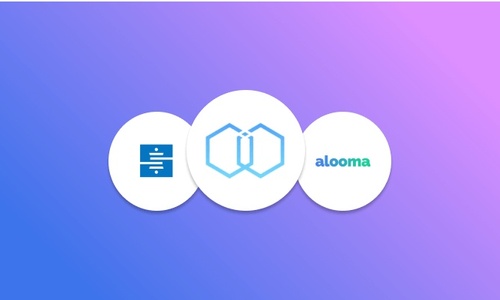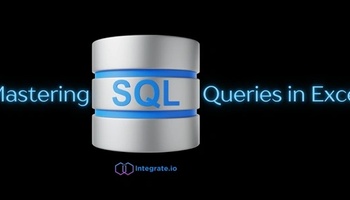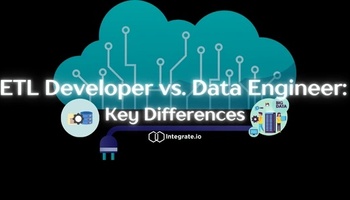Key differences between Stitch, Datastream, and Integrate.io:
-
Customer support: Integrate.io offers excellent free support for ALL users. Datastream offers free community support, and you can optionally pay for access to 24/7 support. Stitch offers chat support and a questions portal for standard users.
-
Data integrations: Integrate.io has 144 integrations and makes creating your own connectors easy. Meanwhile, Stitch integrates with over 136 sources. Datastream natively integrates with Google Cloud services, and you can use Dataflow templates to build custom workflows to connect with other tools.
-
Scalability: All three platforms scale as your business grows. However, how these services are priced varies.
-
Price: Integrate.io charges a flat fee based on how many connectors you need, not by data volume, making it more predictable (and more affordable). Stitch charges based on the number of rows processed per month while Datastream charges based on GB usage.
-
Reviews: Integrate.io has high customer scores on the review website G2 (4.3). While Stitch has fewer reviews, it has a slightly higher score (4.5). Google’s Datastream is not yet listed on G2, TrustPilot, or other popular software review websites (as of December 2022).
Do you know where your data is? Most organizations store data in various destinations (in-house databases, SaaS locations, cloud-based apps, etc.), which makes running analytics far more complicated. Imagine pulling data from all these destinations into one data warehouse or data lake. Life would be so much easier...
"But doesn't this require a lot of code?" you may ask. Not necessarily. The three no-code/low-code tools in this review provide you with the data insights you need without having to burden your development team with building your own data pipelines.
Overview of Integrate.io vs. Stitch vs. Datastream
About Integrate.io
Integrate.io is a cloud-based ETL solution with advanced ELT tools that help streamline data extraction even for large enterprises. As a data integration alternative, Integrate.io requires little to no code at all. Instead, users create nuanced workflows using drag-and-drop tools. Optionally, your development team can also go beyond pre-built connectors and create custom solutions for your use case using integrate.io's advanced toolkit.
With over 144 sources, preloaded transformations, and free support for all users, this cost-effective data integration tool is flexible, transparent, and streamlined. Any business that wants to leverage data-driven features in down-the-line apps, like business intelligence tools, by creating a unified data source will like Integrate.io.
About Stitch
Stitch Data Loader is a cloud-based Extract, Transform, Load (ETL) platform that integrates data from various databases, warehouses, and apps. The result? Businesses run deeper analytics for more accurate data insights. Like integrate.io, Stitch features a no-code/low-code environment.
When it comes to the ETL tools available on Stitch, your team is able to easily transform data while also monitoring it for quality over time. The platform’s powerful big data tools allow you to produce clean data quickly for data warehousing, reporting, and analytics purposes.
Here's a more comprehensive look at Stitch vs. Integrate.io.
About Datastream
Datastream is now a service provided by Google, but a core part of this service was known as Alooma before Google acquired the company in 2019. Now, Datastream is a Google-native solution that makes it easy to integrate your data with services like BigQuery, Cloud Spanner, Dataflow, and Data Fusion.
Unlike traditional ETL, which relies on a model called batch processing, Datastream responds to data as it is generated in real-time (“streaming ETL”). As a result, you can replicate and synchronize your data with minimal latency and performance impact. Because it runs on Google Cloud, Datastream is also able to scale up and down automatically.
Learn more about BigQuery in this Integrate.io post.
Features Comparison Table
Note: Since Datastream is a streaming ETL platform, it’s difficult to make direct comparisons with these other tools.
| Integrate.io | Stitch | Datastream | |
| Trial Length | 14 days | 14 days | Unknown |
| Support | Free for all users (phone, live chat, email, and more) | Only chat support for standard users | Community support with optional paid support |
| G2 Scores | 4.3 | 4.5 | Not Listed |
| Data Transformation | ETL/ELT | ETL/ELT | ETL/ELT |
| Skill Level | No code w/ low-code tools | No code w/ low-code tools | Low-code platform |
| Integrations | 144+ | 136+ | Stream data from Oracle, MySQL and PostgreSQL or build your own connectors |
| Customization | Yes | Yes | Yes |
| SaaS Integration | Yes | Yes | Yes |
| Connects to data warehouses | Yes | Yes | Yes |
| Connects to data lakes | Yes | Yes | Only Google BigQuery |
| SLA support | Yes | Yes | Yes |
| Data Compliance | CCPA, SOC 2, HIPAA, GDPR, SSL/TLS encryption, and more | CCPA, GDPR, SSL/TLS encryption, and more | CCPA, SOC 2, HIPAA, GDPR, and more |
| Developer Tools | REST API, Native Scripting Language, SQL and more | Various | Python |
Data Sources and Integrations
Integrate.io
-
Integrate.io bursts to the brim with over 144 out-of-the-box integrations to popular SaaS tools, BI tools, cloud services, and databases.
-
Database integrations include Amazon Aurora, Amazon RDS, Amazon Redshift, Google BigQuery, Heroku Postgres, MariaDB, MemSQL, Microsoft Azure SQL Database, MongoDB, MySQL, Oracle, and Snowflake.
-
BI tool integrations include Chartio, Looker, and Qlik View.
-
Cloud service integrations include Amazon Kinesis, Base CRM, ChartMogul, Crunchbase, Elasticsearch, Google Drive, HubSpot, Intercom, LivePerson, Magento, and Marketo.
-
Users can ask the Integrate.io team to create custom data sources/destinations.
-
While Integrate.io functions as a no-code platform, your developers have the freedom to dive in and start creating custom solutions with ease using the robust developer toolkit.
To learn more, see the full list of Integrate.io integrations.
Stitch
-
Over 136 database/SaaS integrations.
-
Popular integrations include Aurora, Google Analytics, and Zoom.
-
Users can transform data in SQL, Java, Python, or a graphical user interface (GUI).
-
Users can add a new data source to Stitch if it complies with the standards in the open-source toolkit Singer.
-
Support for standard users is limited.
Datastream
-
Integrate with Datastream, Dataflow, Cloud Data Fusion, Pub/Sub, and any other tool in Google Cloud data services.
-
Stream data from Oracle, MySQL, and PostgreSQL databases into BigQuery and Cloud Storage.
-
Use Dataflow templates to build custom workflows so you can automatically load data into BigQuery for analytics.
-
Replication tools allow you to copy your databases into Cloud SQL or Cloud Spanner to help synchronize your databases.
-
High-security solution with the scalability and reliability you’d expect from a major provider like Google.
Support and Training
Integrate.io
-
Webinars
-
Books and guides
-
Developer resources
-
Excellent free support for ALL users
-
Robust documentation
-
Blog
Stitch
-
Help Center
-
Blog
-
Community
-
Activities
Datastream
-
Documentation
-
Tutorials
-
Google Cloud Blog
-
Community support
-
Paid support
Pricing
Integrate.io
Integrate.io pricing is tailored exactly to each client's needs and requirements with a usage-based component coupled with features and functionality. Clients choose which level of platform usage they will require and then which features and functionality to create a custom plan to fit their use case.
Stitch
Unlike Integrate.io, Stitch pricing scales depending on ingestion volume, which is counted as the number of rows you process every month. However, if you want to go beyond the standard tier, you’ll need to pay an additional fee.
-
Standard plans start at $100/month and scale based on the number of rows ingested
-
Advanced features start at an additional $1,250/per month
-
Premium plans start at an additional $2,500/per month
-
You will need to contact the sales team for a quote if you are interested in more than the standard plan
Datastream
Datastream pricing depends on a few factors, including the cloud region you choose. In addition to CDC usage, you’ll pay separately for any resources used to transfer, store, or process your data, like BigQuery or Cloud Storage.
-
For usage up to 2.5 TB per month for CDC, you’ll pay $2 per GB.
-
For usage between 2.5 TB and 5 TB per month for CDC, you’ll pay $1.50 per GB.
-
For usage between 5 TB and 10 TB per month for CDC, you’ll pay $1.20 per GB.
-
For usage over 10 TB per month for CDC, you’ll pay $0.80 per GB.
-
Backfill costs $0.40 per GB after your first 500 GB each month.
Conclusion
Between these three competitors, Integrate.io offers a user-friendly interface, advanced functionality, and world-class free support on every plan with over 144 integrations to boot. Compared to Stitch and Datastream, Integrate.io is simply more transparent and streamlined while being just as capable. If you’re looking for a fully compliant ETL data integration platform, look no further.
Want to integrate data from all of your destinations? Don't have a data engineering team to do it for you? Sign up for your 14-day trial, then reach out to schedule your ETL Trial Meeting so we can walk you through what you can expect. Learn how Integrate.io’s low- and no-code solutions can help your business unlock its data with ease. Schedule a demo today.











